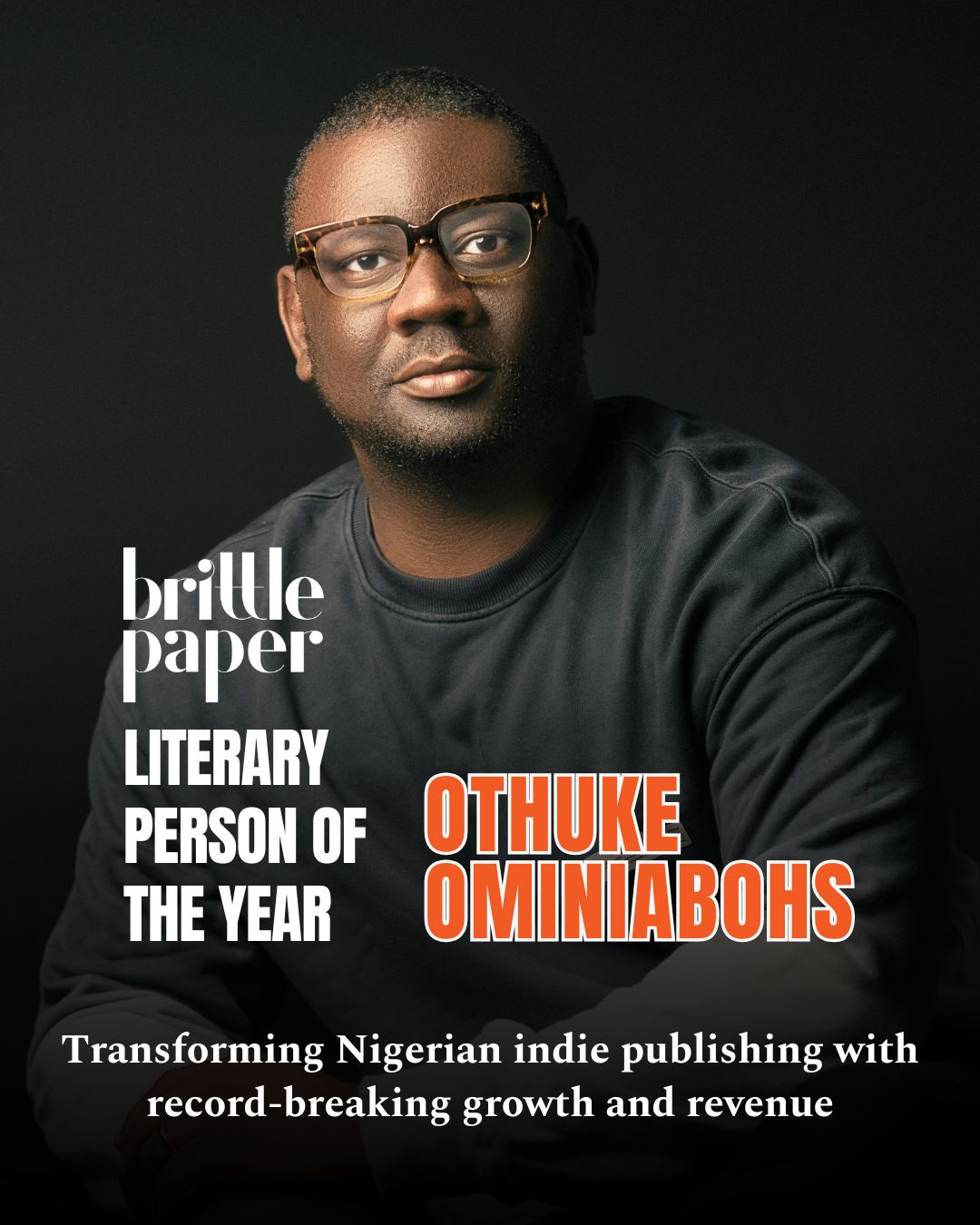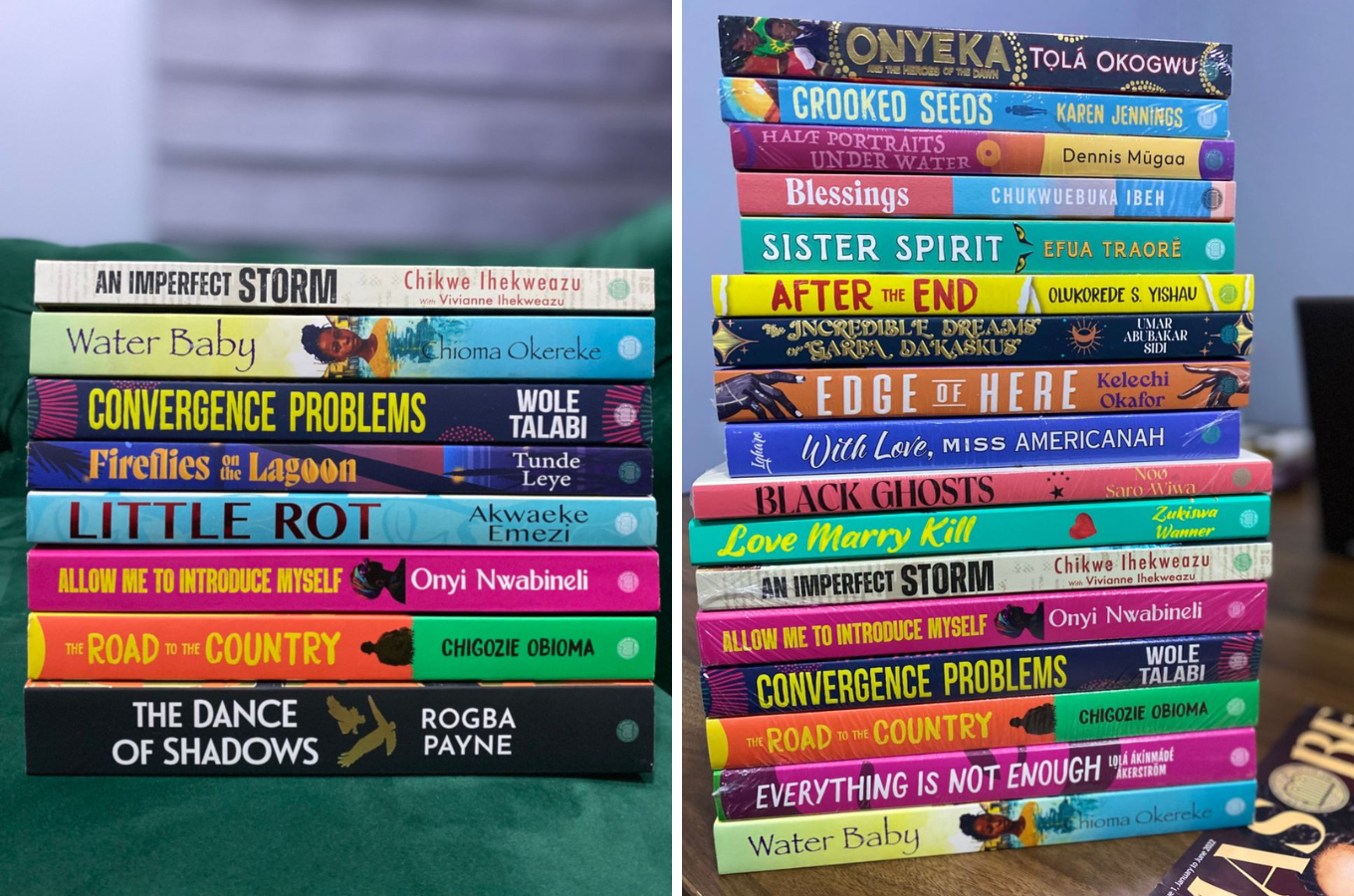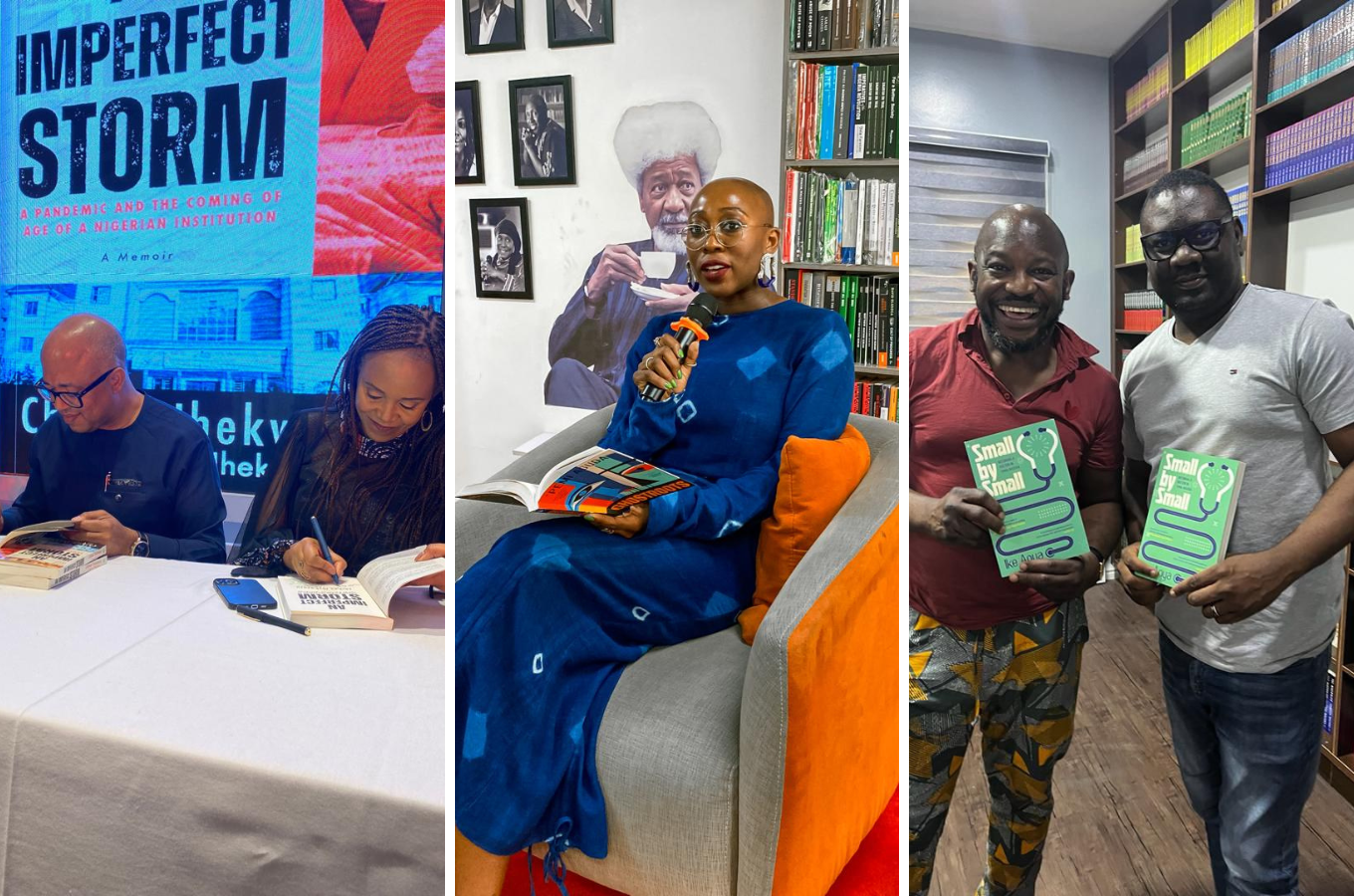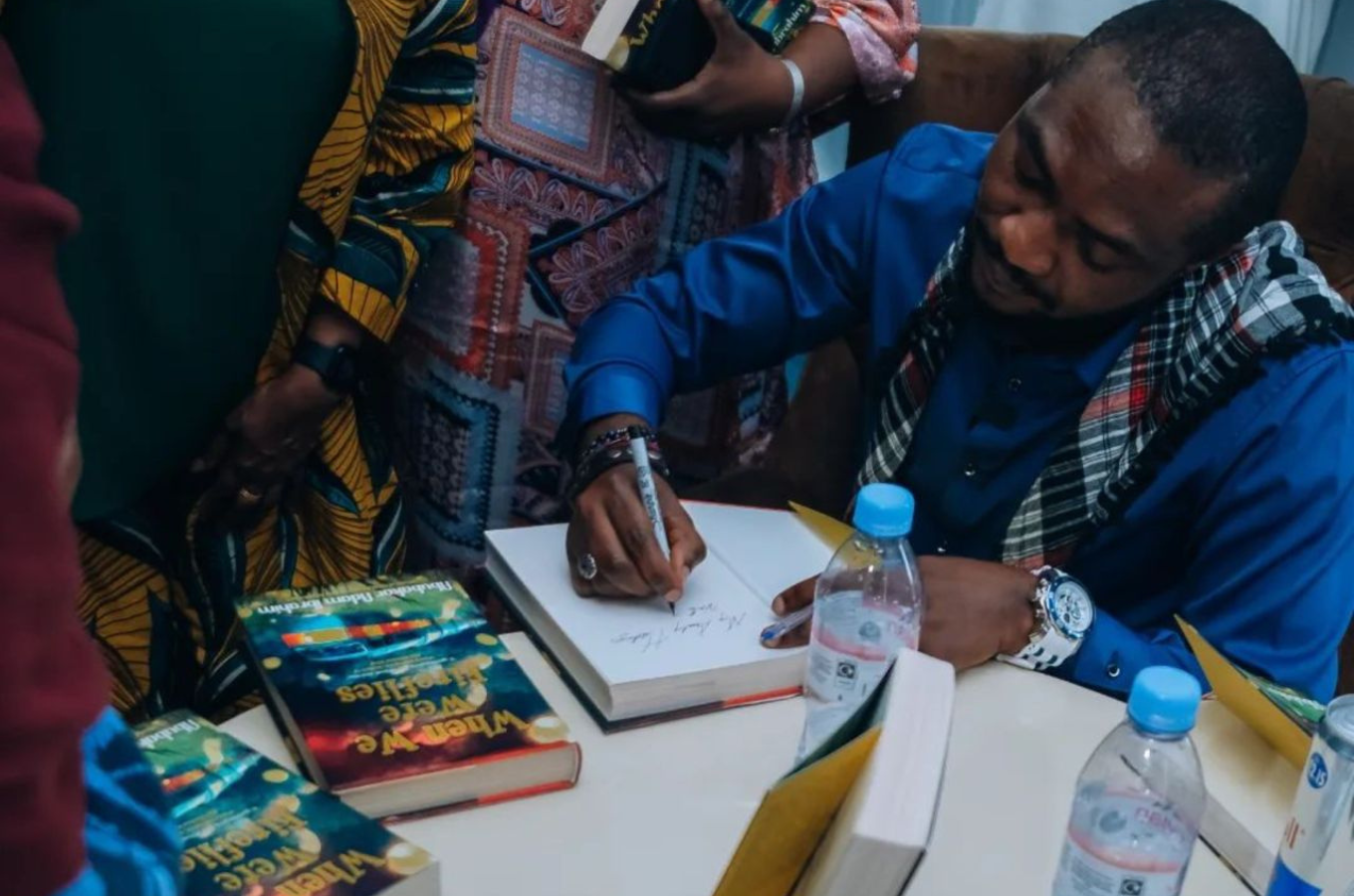
We are delighted to present the 2024 Brittle Paper Literary Person of the Year Award to Othuke Ominiabohs, founder of the Nigerian publishing house Masobe Books. Ominiabohs is redefining independent publishing in Africa. Unlike many publishing businesses on the continent—particularly in Nigeria—Masobe Books has had a steady growth while turning a profit and recording notable success in book sales.
Since its founding in 2018, Masobe has signed 117 authors, published over 100 titles, sold more than 100,000 copies, and bringing in record revenues in just five years. The past two years have been particularly productive, with 28 titles released in 2023 and 41 in 2024. Add to this the stunning visual culture he has cultivated around African books, with striking cover art and creative social media campaigns.

Many have wondered what accounts for Masobe’s success, especially in the face of global publishing struggles and the unique challenges of running a business in Nigeria, a place where entrepreneurs battle hurdles ranging from unreliable distribution channels to limited access to foreign exchange. To learn more, we sat down with Othuke to unpack his playbook. What is he doing differently? What’s his secret? How has he managed to make literary fiction profitable while so many publishing houses around the world are struggling?
For Ominiabohs, the answer lies in his unique journey to publishing. Masobe Books was not born from a desire to sell books alone; it was born out of a near-death experience.
Ominiabohs had the privilege of being surrounded by books from a young age. He was born in Oleh, a small Isoko town in Delta State, Nigeria. Both of his parents were teachers, and his father taught English language and literature. As a result, their home was always filled with books and they made frequent trips to the local government library. Ominiabohs’s father kindled an interest in literature in his children, asking them to recount each story they read and what they liked about it. It is through these childhood experiences with his father that Ominiabohs developed a love for stories and books:
“Back in that local library, I discovered a world filled with magic and wonder, intrigue and suspense. And I couldn’t get enough. As I grew older, I read widely, about eras past and from voices long dead and gone. I consumed every piece of fiction I could find…”
While his father emphasized academic achievements, his mother imparted the values of hard work, resilience, and sacrifice; “She taught us the rules of the streets.” These values come through in Ominiabohs’s difficult personal journey which inspired him to turn to literature in his adult life and go on to found Masobe Books.

Soon after graduating university, Ominiabohs was diagnosed with end stage chronic kidney disease. The diagnosis changed his life. He was so young and had to confront the possibility of his own death. Facing the end, he wanted his life to have purpose. He wanted to be remembered:
“So, I turned to the one thing I knew would keep me alive long after I was gone – stories. And so I wrote, in a desperate bid to engrave my name into the sands of time. Writing and a hope born of a thousand prayers was the only weapon I had against this ailment that was hell-bent on taking me out…I knew for sure – if I survived, I would dedicate the rest of my life in the service of stories.”
In some ways Masobe Books started right there, on the hospital bed on which Ominiabohs thought he would die. And yet, he survived. Determined to stay true to his promise to himself, he self-published his first book Odufa after receiving rejections from other publishers. After self-publishing, there was still the problem of distribution. To get his book to readers, Ominiabohs drove all over Nigeria himself, looking for bookstores that would stock copies for sale. “For someone still in recovery from a major surgery, this was one of the toughest things I’d ever done,” he reflects. But this determination paid off: not only did the book enjoy instant success, selling over 2000 copies in the first year, but this experience in self-publishing and self-distribution also laid the foundation for the network that would bring about Masobe Books.
Odufa put Ominiabohs on the map. Soon, he began to receive manuscripts and requests for advice from up-and-coming writers who had struggled with repeated rejections from other publishers. Many publishing houses focused on African works primarily celebrated in the West. He had to ask: “What was to become of writers like us, who had no such luck with the West, who resided at home and had stories to tell?” Masobe Books was born out of Ominiabohs wanting to find a place for these stories.

Starting a publishing house is not easy. From the lack of a hiring pool of those experienced in the industry, to difficulties in securing funding, to trouble with logistics and distributions, Masobe Books has had its share of challenges. Ominiabohs has relied on no-interest loans from family, his wife’s support with familial responsibilities, and a small but excellent team to keep Masobe Books running. Funding and distribution continue to present challenges, with limited and expensive logistics options that make it challenging to get books into the hands of readers, especially outside Nigeria.wh
What has helped is the network of partnerships that Ominiabohs has built along the way. Notable among these is the distribution arrangement with Medplus Pharmacy, which stocks Masobe titles across hundreds of outlets and has helped expand the company’s reach. Collaborations with key bookstores like Roving Heights, Spine & Label, and Bookpeddlers has also provided reliable distribution channels. At the heart of this growth is a small but exceptional team of ten. Ominiabohs is glowing in his comments on their contributions: “Theresa, our Chief Operating Officer, oversees sales, accounts, and the day-to-day operations; Ofuzim, our creative director, is responsible for all the amazing covers you all love so much; Tahirah, our in-house editor, is one-in-a-billion… she turns everything she touches to gold.” Michael ensures seamless logistics, while Henry and Anthony drive marketing and PR efforts, and Jennifer, Cindy, and Owen handle customer relations and the website. “I know for a fact that I have been blessed with the best team in the world,” reflects Ominiabohs.
Ominiabohs receives many manuscripts, and looks for important narratives that need to be shared with the world for publication. He looks for the feelings of magic, wonder, and beauty that he felt when reading in his local library as a child. Sometimes, he spots a “diamond in the rough,” a manuscript that shows a lot of promise but needs support to reach its final form: “These are the manuscripts that excite me the most; knowing what is possible and enjoying every second of the painstaking process of transforming rough draft to masterpiece.”

Nigerian writer and artist AbdulKareem Baba-Aminu describes Ominiabohs’ efforts as a “crucial crusade” that challenges the idea that “reading culture is dead in Nigeria.” Because of Masobe, he explains, “Reading is suddenly ‘cool’ for young Nigerians!”
Ominiabohs finds inspiration for his work from his own life and his strong belief in sharing stories. He hopes to be able to grow the project of Masobe Books to continue to do just that:
“I wish for every good thing to come our way: more books, more writers, more readers, more bookstores; a bigger literary ecosystem in the continent that will enable us to thrive, with the hopes that we can get every African home reading.”
We wish Ominiabohs all the best for continuing his terrific work with Masobe Books!
How You Can Support Othuke Ominiabohs:
- Buy books from Masobe Books to support African authors and independent publishing.
- Follow @masobebooksng on social media (IG: @masobebooksng) for updates on their latest releases and initiatives.
- Share this article and their work with fellow readers and book lovers.
- Recommend Masobe titles to bookstores, schools, libraries, and reading communities.









COMMENTS -
Reader Interactions